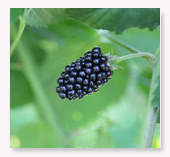Blackberry in nutrition

- Blackberry fruit contains essential oils, tanine and pectine, amber, malic, oxalic, lactic, salicil acid and a large amount of vitamin C (even 21 g of vitamin C per 100 g of blackberries).
- It is very rich in fibres, and it also contains iron (which is very important for the children in the first two years of their lives, and for pregnant and nursing women, in puberty as well as in menopause) and calcium. To sum up, blackberry is a great source of iron in nutrition.
- Laboratory tests show the great antioxidant effect and lower LDL colesterol levels, the so called bad cholesterol. However, the andtioxidant effect of frozen blackberries has not yet been examined, which would be a valuable information since they cannot stay long being fresh.
- Blackberry juice contains betains, which stimulate liver cells, and protect the liver and biliary pathways from various health problems.
- Beside the fruit, the root(peel it and dry it in the sun) and the leaf are also used having a great amount of tanine which, with its contracting effect, is used in healing dysentery (severe diarrhea)
- Early and delicate leaves and upper floral tops are gathered from April until the end of May.
- Eating blackberry fruits was used to consider to stop vomiting.
- Blackberry is a healing plant widely used in popular medicine.
- Blackberry fruits are rich in antioxidans.
Blackberry as afrodisiac

The afrodisiac effect of blackberry fruit has been known to Arab people where the blackberry is much admired fruit, and there is a tradition of chewing blackberry leaves to render sexual stimulus. Various sorts of blackberry wines and syrups intensify male sex drive.
Blackberry against cancer
At this year's American Society of Clinical Oncology convention it has been pointed out that berries, especially blackberries, with their antioxidants have strong effect against cancer, while with blackberries the main function has a dark pigment antocianid. Experiments done on animals show that with consumption of blackberries the frequency of esophagus cancer is decreased for 60%, and colon cancer for 80%. Also, the blackberry represses oral cavity cancer as well as some other.



